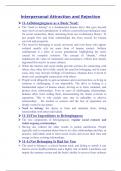Interpersonal Attraction and Rejection
11-1aBelongingness as a Basic Need:
The "need to belong" is a fundamental human drive that goes beyond
mere survival and reproduction. It reflects a powerful psychological urge
for social connection, likely stemming from our evolutionary history. To
put people first and form relationships has been crucial for human
survival and prosperity.
This need for belonging is nearly universal, and even those who appear
isolated usually rely on some form of human contact. Solitary
confinement is a form of severe punishment, highlighting the stress
caused by complete isolation. The concept of "ubuntu," which
emphasizes the value of community and acceptance, reflects how deeply
ingrained this need is in some cultures.
While the internet and social media provide avenues for connecting with
others, they often fail to fully satisfy the need for belonging, and in some
cases, they may increase feelings of loneliness. Humans have evolved to
desire real, meaningful connections with others.
People work diligently to gain acceptance and avoid rejection, as living in
isolation is challenging, if not impossible. The drive to belong is a
fundamental aspect of human nature, driving us to form, maintain, and
protect close relationships. Even in cases of challenging relationships,
humans often resist ending them, demonstrating the innate aversion to
separation. This is why people may stay in unhealthy or abusive
relationships – the instinct to connect and the fear of separation are
deeply rooted in our nature.
Need to belong: the desire to form and maintain close, lasting
relationships with other individuals.
11-1bTwo Ingredients to Belongingness
The two components of belongingness: regular social contacts and
stable ongoing relationships.
Having one without the other results in partial satisfaction. People
typically seek to maintain about four to six close relationships and that, in
practice, individuals tend to form social circles and invest their time and
energy in those existing relationships.
11-1cNot Belonging Is Bad for You
The need to belong is a critical human need, and failing to satisfy it can
lead to severe health problems and a higher risk of death. Loneliness can
impair the immune system and the body's ability to recover from sickness
, or injury. Having a strong social network is crucial for well-being and
happiness. In South Africa, the social distance between generations may
widen due to different life experiences, affecting how generations relate
to each other. Belonging is linked to life's overall meaningfulness.
11-1dBest Friends, Lovers and Groups
Human beings have options to satisfy their need to belong beyond close
friends and romantic relationships. They can also find belonging in
groups or organizations, which may be satisfying even if they don't form
close friendships there. This is often more effective for men than for
women.
11-2Attraction: Who Likes Whom?
Social psychologists have studied the factors influencing the formation of
friendships and attraction between people. Edward E. Jones, an influential
researcher, has explored the concept of ingratiation, which involves
active efforts to make someone like you. Some key factors that influence
attraction include physical attractiveness, friendliness, similarity, and
being kind to others.
11-2aSimilarity, Complementarity, Oppositeness
In the battle of the clichés "birds of a feather flock together" and
"opposites attract," social psychologists have found that similarity is a
potent cause of attraction. Research has shown that people are more often
attracted to those who are similar to themselves. This is observed in
various areas, such as friendships, relationships, and even marriage. The
matching hypothesis suggests that people tend to pair up with others
who are equally attractive. The attraction to similar others is deeply
rooted in human psychology, possibly because attaching to similar
individuals provided an evolutionary advantage in forming social groups.
While culture emphasizes the value of diversity and complementarity in
certain contexts, such as the workplace, when it comes to friendships and
romantic relationships, people still tend to seek out those who are similar
to themselves. This is why people are often attracted to others who share
common characteristics and interests.
11-2bSocial Rewards: You Make Me Feel Good
Rewards and positive actions play a significant role in interpersonal
attraction and relationship formation. People tend to like those who do
them favors and offer compliments because these actions make them feel
good.
Doing favors and giving compliments (2 broad strategies for getting
people to like you) reinforce positive traits and behaviours, strengthening




